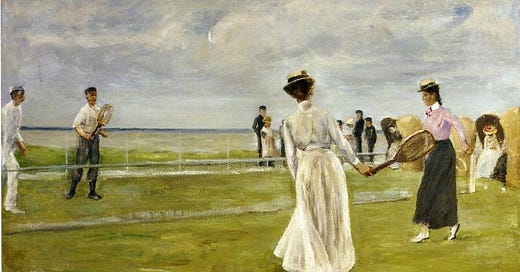Eighteen months ago, I quit playing tennis.
It was a simple decision, maybe a little bratty. Three hitting partners left my life around the same time: one moved to the Midwest for work, one got injured, one moved across town—which, in Los Angeles, may as well be the Midwest.
Playing public court tennis is relationship-dependent. You need someone at your level, with a similar schedule, with a demeanor you appreciate or at least don’t despise. Also, I recognized I felt burned out. I’d played maybe three times a week for maybe fifteen years straight, and it’s a sport I love, that I didn’t want to hate.
One of the reasons I find tennis beautiful is because it’s both heady and visceral. Putting aside things to do with adeptness, strategy, the simple pleasure of hitting a well-struck ball, playing tennis is an interesting way to watch your psyche. The insecurities come out. There’s drive or its absence. Menace and fear and sportsmanship, good or bad—basically, it’s boxing without the blows, relationship without talking. Play enough and there’s a sense that it’s fundamentally a game played alone, despite whoever’s across the net, which can start to seem a lot like life—fundamentally solitary, but best enjoyed in others’ company.
A friend of mine, a former college player who’s now a professional instructor, said one morning after we hit, “Everything going on in my life shows up on court. It’s basically free therapy if you pay attention.”
(Somewhat related, there’s an obscure, very silly out-of-print book in tennis literature called Sex as a Sublimation for Tennis: From the Secret Writings of Freud. It’s a one-note satire, and I don’t recommend it—The Inner Game is the tennis/psychology text to beat—but I dig the inspiration.)
Anyway, eighteen months ago, I stopped playing and joined a climbing gym, and there I found a new group of friends, with whom I would boulder and lift and sauna and get beers… until recently, when that group kinda fell away. One moved to Italy for a couple months. One got injured. One is swamped with work.
So, now I’m on the court again. Rusty, so rusty. Happy, even thrilled— “bright with ache,” as Jim Hall writes in his poem “Tennis Elbow.”
And also: noticing ways I’m different, and ways that I’m the same, now that I’m back.
𓀠 Hi. I’m able to write these meditations thanks to paying subscribers.
Level up and enjoy tomorrow’s supplement with three-plus things to love—new music, great books, and cool stuff generally.
Because for real, your membership makes all of this possible.
Tomorrow’s three-plus things—
Perfect khakis, which is not a thing I ever thought I would recommend
Favorite live Grateful Dead (pre-Dead & Co), favorite studio Primal Scream
The best (non-political stuff) from the week online
❀ Hey, if you’re a writer looking for help—editing, coaching, brainstorm magic—I recommend collaborating with my partner, Rachel Knowles.
Rachel has helped me significantly, not to mention a lot of other writers—novelists, screenwriters, Substack-ers, the gamut. Whether you’re aspiring or established, everyone needs an editor. More info at her website.
What the what
“Meditations in an Emergency” is a weekly essay from author Rosecrans Baldwin about something beautiful. Paying subscribers receive a Sunday supplement with three-plus things to love, plus a monthly travel-lust ballyhoo.
Rosecrans is a correspondent for GQ, a contributor at Travel + Leisure, and the bestselling author of Everything Now: Lessons From the City-State of Los Angeles, winner of the California Book Award. Other books include The Last Kid Left and Paris, I Love You but You’re Bringing Me Down. His debut novel, You Lost Me There, was a New York Times Book Review Editors’ Choice.
For books, articles, bio, contact info: rosecransbaldwin.com.




